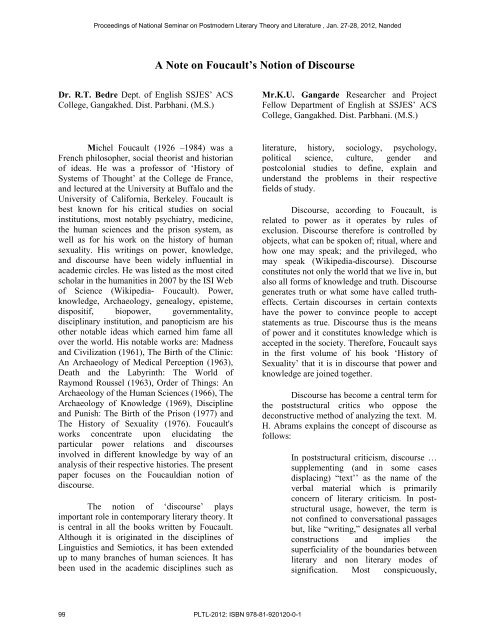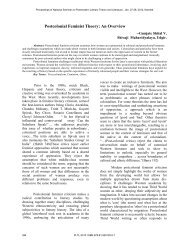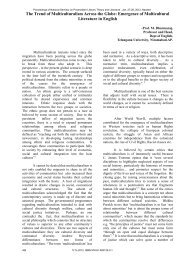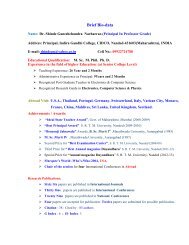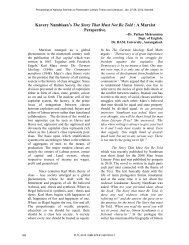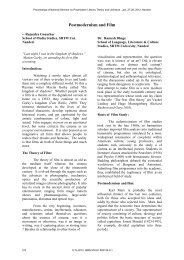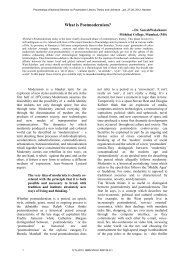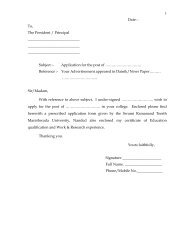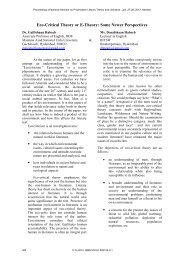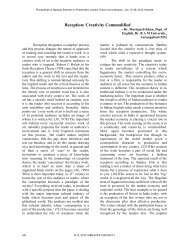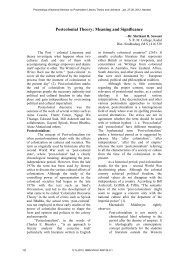Post-Structuralism: An Indian Preview - Igcollege.org
Post-Structuralism: An Indian Preview - Igcollege.org
Post-Structuralism: An Indian Preview - Igcollege.org
You also want an ePaper? Increase the reach of your titles
YUMPU automatically turns print PDFs into web optimized ePapers that Google loves.
Proceedings of National Seminar on <strong>Post</strong>modern Literary Theory and Literature , Jan. 27-28, 2012, Nanded<br />
A Note on Foucault’s Notion of Discourse<br />
Dr. R.T. Bedre Dept. of English SSJES’ ACS<br />
College, Gangakhed. Dist. Parbhani. (M.S.)<br />
Mr.K.U. Gangarde Researcher and Project<br />
Fellow Department of English at SSJES’ ACS<br />
College, Gangakhed. Dist. Parbhani. (M.S.)<br />
Michel Foucault (1926 –1984) was a<br />
French philosopher, social theorist and historian<br />
of ideas. He was a professor of ‘History of<br />
Systems of Thought’ at the College de France,<br />
and lectured at the University at Buffalo and the<br />
University of California, Berkeley. Foucault is<br />
best known for his critical studies on social<br />
institutions, most notably psychiatry, medicine,<br />
the human sciences and the prison system, as<br />
well as for his work on the history of human<br />
sexuality. His writings on power, knowledge,<br />
and discourse have been widely influential in<br />
academic circles. He was listed as the most cited<br />
scholar in the humanities in 2007 by the ISI Web<br />
of Science (Wikipedia- Foucault). Power,<br />
knowledge, Archaeology, genealogy, episteme,<br />
dispositif, biopower, governmentality,<br />
disciplinary institution, and panopticism are his<br />
other notable ideas which earned him fame all<br />
over the world. His notable works are: Madness<br />
and Civilization (1961), The Birth of the Clinic:<br />
<strong>An</strong> Archaeology of Medical Perception (1963),<br />
Death and the Labyrinth: The World of<br />
Raymond Roussel (1963), Order of Things: <strong>An</strong><br />
Archaeology of the Human Sciences (1966), The<br />
Archaeology of Knowledge (1969), Discipline<br />
and Punish: The Birth of the Prison (1977) and<br />
The History of Sexuality (1976). Foucault's<br />
works concentrate upon elucidating the<br />
particular power relations and discourses<br />
involved in different knowledge by way of an<br />
analysis of their respective histories. The present<br />
paper focuses on the Foucauldian notion of<br />
discourse.<br />
The notion of ‘discourse’ plays<br />
important role in contemporary literary theory. It<br />
is central in all the books written by Foucault.<br />
Although it is originated in the disciplines of<br />
Linguistics and Semiotics, it has been extended<br />
up to many branches of human sciences. It has<br />
been used in the academic disciplines such as<br />
literature, history, sociology, psychology,<br />
political science, culture, gender and<br />
postcolonial studies to define, explain and<br />
understand the problems in their respective<br />
fields of study.<br />
Discourse, according to Foucault, is<br />
related to power as it operates by rules of<br />
exclusion. Discourse therefore is controlled by<br />
objects, what can be spoken of; ritual, where and<br />
how one may speak; and the privileged, who<br />
may speak (Wikipedia-discourse). Discourse<br />
constitutes not only the world that we live in, but<br />
also all forms of knowledge and truth. Discourse<br />
generates truth or what some have called trutheffects.<br />
Certain discourses in certain contexts<br />
have the power to convince people to accept<br />
statements as true. Discourse thus is the means<br />
of power and it constitutes knowledge which is<br />
accepted in the society. Therefore, Foucault says<br />
in the first volume of his book ‘History of<br />
Sexuality’ that it is in discourse that power and<br />
knowledge are joined together.<br />
Discourse has become a central term for<br />
the poststructural critics who oppose the<br />
deconstructive method of analyzing the text. M.<br />
H. Abrams explains the concept of discourse as<br />
follows:<br />
In poststructural criticism, discourse …<br />
supplementing (and in some cases<br />
displacing) “text’’ as the name of the<br />
verbal material which is primarily<br />
concern of literary criticism. In poststructural<br />
usage, however, the term is<br />
not confined to conversational passages<br />
but, like “writing,” designates all verbal<br />
constructions and implies the<br />
superficiality of the boundaries between<br />
literary and non literary modes of<br />
signification. Most conspicuously,<br />
99 PLTL-2012: ISBN 978-81-920120-0-1


